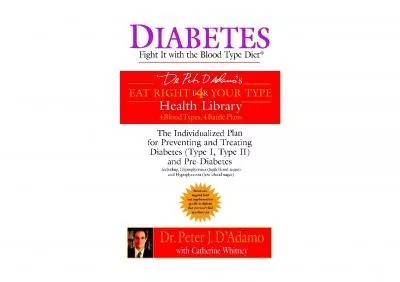PPT-Diabetes Basics
Author : min-jolicoeur | Published Date : 2016-06-21
KBN 2014 Understanding Diabetes Complex disease Digestion breaks down carbohydrates sugar glucose Sugar bloodstream Insulin moves sugar into cells for energy KBN
Presentation Embed Code
Download Presentation
Download Presentation The PPT/PDF document "Diabetes Basics" is the property of its rightful owner. Permission is granted to download and print the materials on this website for personal, non-commercial use only, and to display it on your personal computer provided you do not modify the materials and that you retain all copyright notices contained in the materials. By downloading content from our website, you accept the terms of this agreement.
Diabetes Basics: Transcript
Download Rules Of Document
"Diabetes Basics"The content belongs to its owner. You may download and print it for personal use, without modification, and keep all copyright notices. By downloading, you agree to these terms.
Related Documents














